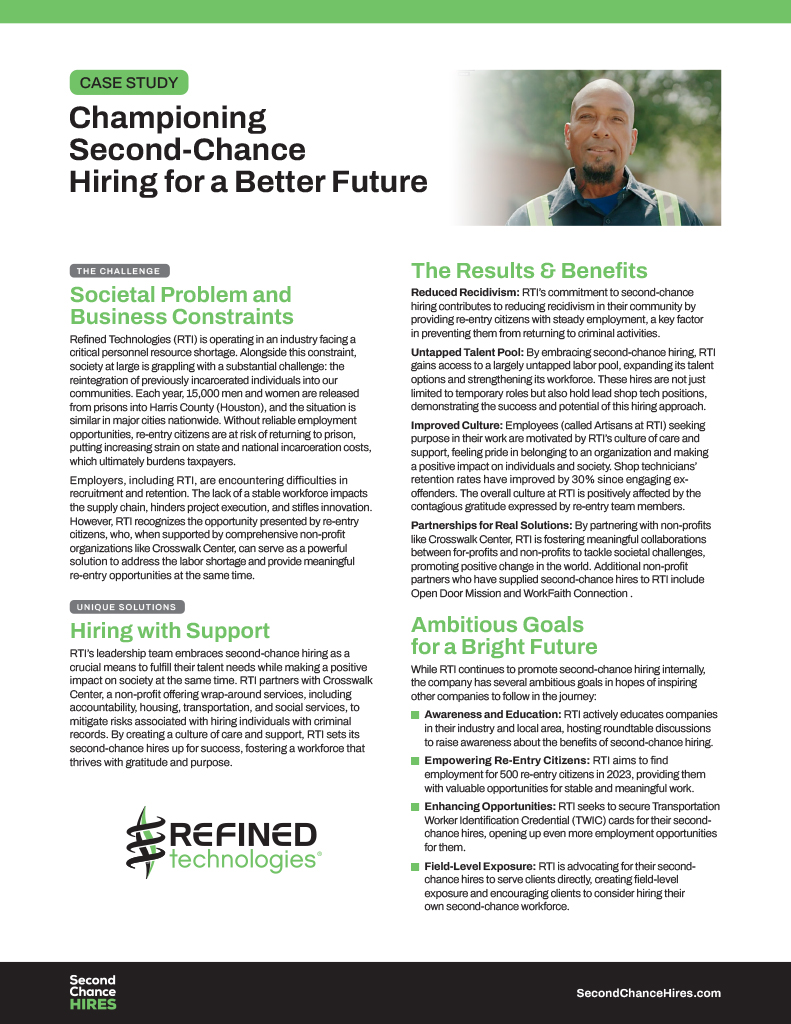Case Studies
Championing Second-Chance Hiring for a Better Future
The Challenge Societal Problem and Business Constraints
Refined Technologies (RTI) is operating in an industry facing a critical personnel resource shortage. Alongside this constraint, society at large is grappling with a substantial challenge: the reintegration of previously incarcerated individuals into our communities. Each year, 15,000 men and women are released from prisons into Harris County (Houston), and the situation is similar in major cities nationwide. Without reliable employment opportunities, re-entry citizens are at risk of returning to prison, putting increasing strain on state and national incarceration costs, which ultimately burdens taxpayers.
Employers, including RTI, are encountering difficulties in recruitment and retention. The lack of a stable workforce impacts the supply chain, hinders project execution, and stifles innovation. However, RTI recognizes the opportunity presented by re-entry citizens, who, when supported by comprehensive non-profit organizations like Crosswalk Center, can serve as a powerful solution to address the labor shortage and provide meaningful re-entry opportunities at the same time.
Unique Solutions Hiring with Support
RTI’s leadership team embraces second-chance hiring as a crucial means to fulfill their talent needs while making a positive impact on society at the same time. RTI partners with Crosswalk Center, a non-profit offering wrap-around services, including accountability, housing, transportation, and social services, to mitigate risks associated with hiring individuals with criminal records. By creating a culture of care and support, RTI sets its second-chance hires up for success, fostering a workforce that thrives with gratitude and purpose.
The Results & Benefits
Reduced Recidivism: RTI's commitment to second-chance hiring contributes to reducing recidivism in their community by providing re-entry citizens with steady employment, a key factor in preventing them from returning to criminal activities.
Untapped Talent Pool: By embracing second-chance hiring, RTI gains access to a largely untapped labor pool, expanding its talent options and strengthening its workforce. These hires are not just limited to temporary roles but also hold lead shop tech positions, demonstrating the success and potential of this hiring approach.
Improved Culture: Employees (called Artisans at RTI) seeking purpose in their work are motivated by RTI's culture of care and support, feeling pride in belonging to an organization and making a positive impact on individuals and society. Shop technicians' retention rates have improved by 30% since engaging ex-offenders. The overall culture at RTI is positively affected by the contagious gratitude expressed by re-entry team members.
Partnerships for Real Solutions: By partnering with non-profits like Crosswalk Center, RTI is fostering meaningful collaborations between for-profits and non-profits to tackle societal challenges, promoting positive change in the world. Additional non-profit partners who have supplied second-chance hires to RTI include Open Door Mission and WorkFaith Connection.
Ambitious Goals for a Bright Future
While RTI continues to promote second-chance hiring internally, the company has several ambitious goals in hopes of inspiring other companies to follow in the journey:
- Awareness and Education: RTI actively educates companies in their industry and local area, hosting roundtable discussions to raise awareness about the benefits of second-chance hiring.
- Empowering Re-Entry Citizens: RTI aims to find employment for 500 re-entry citizens in 2023, providing them with valuable opportunities for stable and meaningful work.
- Enhancing Opportunities: RTI seeks to secure Transportation Worker Identification Credential (TWIC) cards for their second-chance hires, opening up even more employment opportunities for them.
- Field-Level Exposure: RTI is advocating for their second-chance hires to serve clients directly, creating field-level exposure and encouraging clients to consider hiring their own second-chance workforce.


